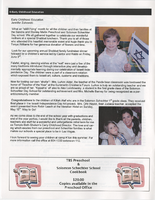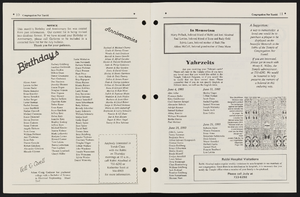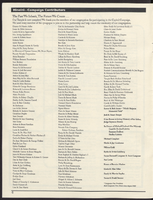Search the Special Collections and Archives Portal
Search Results
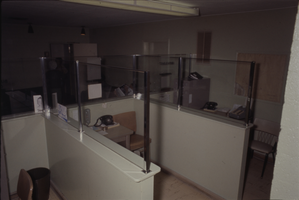
Color view of a shared office area.
Date
Description
Image
Station Casinos, Inc.
Station Casinos, Inc., was started by Frank J. Fertitta Jr. in 1976 in Las Vegas, Nevada as a single gambling facility. The facility was known as The Casino and underwent various expansions over the years before changing its name to the Palace Station in 1983. Fertitta’s son, Frank J. Fertitta III, joined the company in 1984 as vice president and director. Station Casinos continued expanding throughout the 1990s and establishing additional gaming facilities in Missouri including riverboat and dockside gaming in St.
Corporate Body
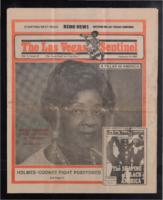
Mabel Hoggard: newspaper clippings and school records
Date
Archival Collection
Description
Folder of materials from the Mabel Hoggard Papers (MS-00565) -- Personal papers file. This folder contains materials about Mabel Hoggard, including a Las Vegas Sentinel newspaper issue, newspaper clippings, a decree of divorce (Mabel E. Wims vs Irvin E. Wims), a memorial service program (Mabel Welch Wims Hoggard, March 10, 1905- May 31, 1989), and U.S. Congressional Records recognizing the achievements of Mrs. Mabel W. Hoggard. Mabel Hoggard's student records were not digitized per the Special Collections and Archives restrictions policy.
Mixed Content
Frey, James H. (1941 June 29-)
James Frey was born in Eureka, South Dakota, in 1941. His father worked in creamery and his mother was a registered nurse. When Frey was nine, the family, including his twin sister, relocated in Sioux Falls where his dad was plant manager for a dairy. He joined the YMCA in the fourth grade and ended up working for them until around the age of 22. He attended Augustana College in Sioux Falls, graduating with a major in sociology and a minor in history. After graduation, he worked for three years at the YMCA in Sioux Falls as program director.
Person
Corporate records, 1920 to 1992, 1927 to 1979
Level of Description
Scope and Contents
The corporate records (1920-1990) for Hughes Productions consist of administrative, distribution, financial, and legal records, as well as records from the Motion Picture Association of America and United Artists Corporation and records pertaining to unproduced works.
Administrative records contain correspondence, as well as vault inventories, assets list, and personnel files. Distribution records contain agreements, correspondence, and information pertaining to The Outlaw's ban. Financial records include ledgers, correspondence, invoices, and international profit reports. Legal records include contracts for actors and screenwriters, as well as correspondence, agreements, and affidavits pertaining to loan information and court case proceedings.
Motion Picture Association of America (MPAA) records consist primarily of weekly reports from the MPAA detailing film title registration reports either held or withdrawn, as well as memoranda. United Artists Corporation records include contract analyses, settlement statements and ledgers detailing The Outlaw's domestic and international earnings. Unproduced works contain screenplays, synopses, story treatments, right's agreements, and correspondence pertaining to stories sent to Hughes Productions.
Archival Collection
Collection Name: Howard Hughes Film Production Records
Box/Folder: N/A
Archival Component

Morgan H. Mills interview, March 26, 1981: transcript
Date
Archival Collection
Description
On March 26, 1981, Matthew A. Carr interviewed Morgan Mills (b. July 27, 1914 in Grand Junction, Colorado) about his life in Boulder City, Nevada and his work at the Boulder (Hoover) Dam site. Mills speaks primarily about his time working on the dam as a mechanic with the United States Bureau of Reclamation, as a tourist guide with the Boulder City Tourist Bureau and as a musician in local bands. Moreover, Mills speaks about attending the University of Nevada, Reno and playing music there. Lastly, he talks about the Great Depression, how it affected Las Vegas and Boulder City, the development of different infrastructure and the speakeasies in Boulder City during the Prohibition era.
Text

